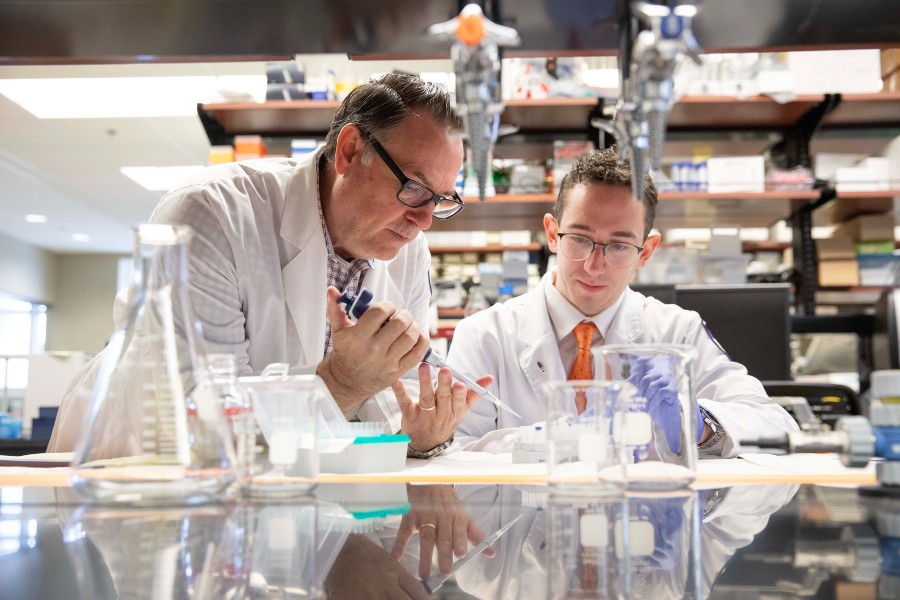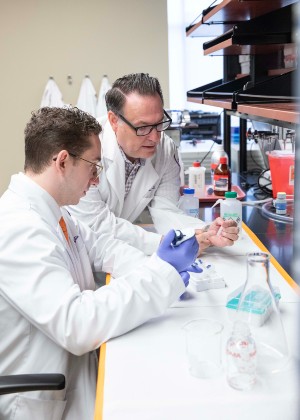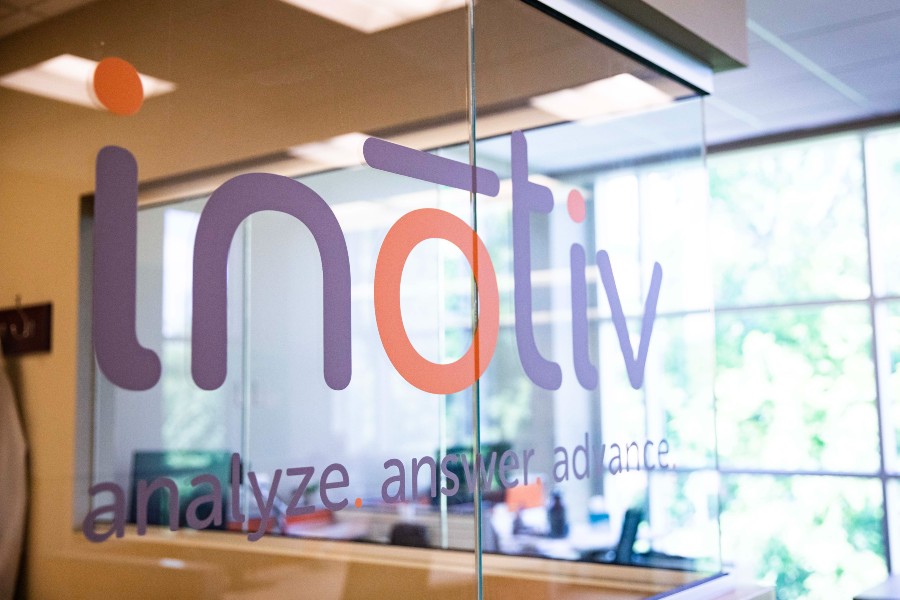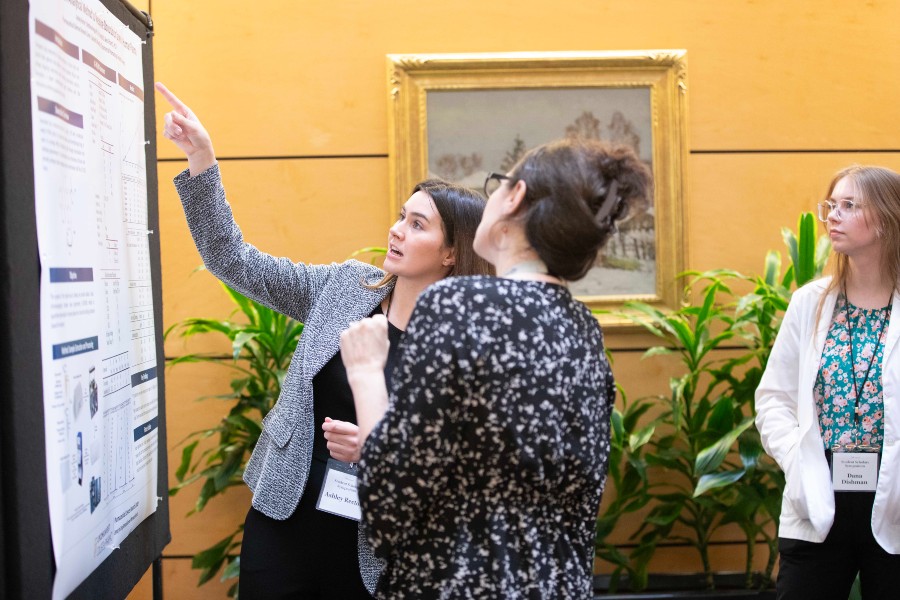Pharmaceutical research on the front lines of industry
Lipscomb-Inotiv partnership and new master’s program promise to fill a gap in the scientific research community.
Janel Shoun-Smith | 615-966-7078 |

The new on-campus lab for nationwide contract research organization Inotiv allows the company's scientists to mentor Lipscomb pharmaceutical science master’s students.
Thanks to an innovative new partnership with Inotiv, a nationwide contract research organization, Lipscomb’s College of Pharmacy students now have broader career pathways open to them and the opportunity to get one-on-one, applied drug development research experience while still earning their advanced degree.
Inotiv, which provides products and services focused on bringing new drugs and medical devices through the discovery and preclinical phases of development, now operates its Nashville location out of 3,000 renovated square feet in Lipscomb’s Pharmaceutical Sciences Research Center.
Through a five-year partnership established in December 2023, Lipscomb is now able to draw on the expertise of Inotiv’s research scientists to provide one-on-one, real-world industry research experience for students on campus.
Lipscomb has expanded its degree offerings within the College of Pharmacy, adding a new Masters of Pharmaceutical Sciences degree designed to prepare students to continue on to a Ph.D. in pharmacology or to go directly into the pharmaceutical industry workforce as research scientists in contract research organizations such as Inotiv or major pharmaceutical companies.

Student Lino Gaglio with Dr. Scott Daniels
Sending students straight into the industry is where the partnership with Inotiv becomes so valuable for both the graduates and Inotiv, said Dr. Scott Akers, executive director of the Pharmaceutical Sciences research center and associate dean of research. Students can experience what the workplace is like even before they graduate, and Inotiv can develop a relationship with a potential employee entering a field that is currently short on new recruits, he said.
“We looked at this collaboration as a way to foster recruiting opportunities with exceptional people,” said Dr. Scott Daniels, Inotiv’s senior vice president in discovery and translational sciences, who works from the Lipscomb-Inotiv Laboratory on campus and is also an adjunct professor of Pharmaceutical Sciences for Lipscomb.
Both Akers and Daniels say they see a need in the industry for more pharmaceutical research trained scientists focused on applied drug discovery and clinical development.
“Pharmaceutical science research and education training is becoming more rare in the academic world,” said Daniels. “Lipscomb sensed the deficit and seized on an opportunity to partner within Inotiv’s mission and approach. When we see a master’s program at a fine institution surface, and it meets one of our greatest needs, we jump on it.”
Since 2006, Akers has developed a focus on pharmacokinetics research (the study of how the body processes an excretes a drug), at Lipscomb by pursuing grants to conduct clinical research and by training Lipscomb’s Pharm.D. graduates with the skills needed to pursue a Ph.D. in pharmacological sciences through a pathway program with Vanderbilt University.
Through this focus, Pharm.D. students have been able to supplement their studies with research experience in studies supported by the American Heart Association, National Institutes of Health, Northwestern University, Vanderbilt and Cleveland Clinic, to name just a few.
Now, partnering with Inotiv opens a new path for Lipscomb students who may want to pursue a career in pharmaceutical sciences without earning a Pharm.D. degree. Inotiv can provide hands-on training in the nonclinical and analytical drug discovery and development services it provides to pharmaceutical and medical device industries.
“Their interests overlay nicely with our interest in pharmacokinetics and drug metabolism, and by having them in-house, we can have Inotiv scientists help train our master’s students,” explained Akers.
The relationship between Lipscomb and Inotiv grew from a relationship between Akers and Daniels, begun 12 years ago, when Daniels was a professor at Vanderbilt University’s Pharmacology Department and on the receiving end of Lipscomb students in the Pharm.D. to Ph.D. Pathway Program. The two have published together, and over the years both became involved in Inotiv.

Inotiv, which brings new drugs and medical devices through the discovery and preclinical phases of development, now operates its Nashville location out of 3,000 renovated square feet on Lipscomb's campus.
“Scott Akers was a progressive thinker on the interdisciplinary nature of research,” Daniels said, “and interdisciplinary is how biopharmaceutical companies operate.”
Daniels left Vanderbilt in 2016 and is now leading Inotiv’s discovery staged business spanning three states, including Tennessee. He established a new Inotiv lab at Lipscomb in order to provide growth opportunities for its newest discovery team: Platformed Technologies.
This summer, pharmacy student Lino Gaglio is the first Lipscomb master’s student to partner with an Inotiv researcher, and nine students, five being current Lipscomb Pharm.D. students earning a dual degree, are enrolled in the master’s program.
“This partnership is a truly symbiotic relationship,” said Akers. “Not only could Inotiv researchers become adjunct professors at Lipscomb or research mentors on student academic projects, but their employees could pursue a masters degree at Lipscomb to expand their training and expertise while working on Inotiv projects. We want to be an educational partner with them in the workforce.
“Inotiv is in the business of helping pharmaceutical companies move their drug product through the drug development pipeline and they need more people who know how to do that,” said Akers. “With this partnership, we can take a student and put them right on the front lines of one of the leading contract organizations in the nation.”
“It is one piece of the pharmaceutical industry’s discovery engine, but this is a uniquely positioned match,” said Daniels. “Whether students come to work at Inotiv or if they use this relationship as a springboard to go to another company, to teach or go into governmental research and policy, we feel that it is our responsibility in the scientific community to be a part of this important training mission.”
According to Akers, the master’s program “makes us much more diverse in where we can send our graduates,” allowing them to graduate directly into industry positions and rare fellowships like the clinical pharmacologist position that May 2024 Pharm.D. graduate Dr. Anne Carlisle earned at Boehringer Ingelheim, one of the largest private pharmaceutical companies in the world.

Ashley Rector worked to develop a measurement of the breast cancer drug doxorubicin in the body. She presented her research at the Student Scholars Symposium.
Currently, master’s students are working on various pharmacokinetics research projects (outside of the Inotiv lab) such as:
- Dana Dishman’s study determined the stability of an asthma drug in order to prepare it in larger volumes for a pediatric trial. Working with pediatric physicians at the Monroe Carell Jr. Children’s Hospital at Vanderbilt University Medical Center. Dishman and Akers found that the drug montelukast is stable for at least 72 hours in pharmaceutical grade liquid suspension. This compounded suspension is currently being used in the clinical trial to determine patient-specific pharmacokinetics in easing acute asthma attacks in children. Dishman, who had done research during her undergraduate years, switched from pursuing Lipscomb’s pharmacy management dual degree to the Master of Pharmaceutical Science once it became available. She appreciates the opportunity to work with researchers, internationally in some cases, and the ability to work hands-on with biomedical equipment, she said. “This degree has expanded my world a lot,” said Dishman, who will graduate in 2026.
- Ashley Rector worked to develop a measurement of the breast cancer drug doxorubicin in the body to see if it could ultimately be paired with other drugs in a human trial. Her work showed how much concentration of the drug was found in human plasma to compare to the dosing amounts administered. She is also learning how to model and simulate human drug exposure using industry leading pharmacokinetic software and will graduate with the pharmaceutical science dual degree in May 2025.
- Joanna Cravens’ and Katelyn Covington’s research developed a way to measure the levels of three separate drugs in a blood sample to support a human clinical trial using ifetroban to treat patients with idiopathic pulmonary fibrosisl. Covington and Cravens developed an assayas a way to measure the drugs nintedahib, pirfenidone and ifetroban simultaneously in patient samples that will be analyzed by Akers’s laboratory. Developing this assay will be critical for evaluating potential drug interactions with ifetroban since both drugs will continue to be administered to patients during the clinical trial. “This master’s will broaden what I can do in my career,” said Covington. “I was considering a clinical hospital position, but now I may go into research in industry, perhaps apply for fellowships.”
- Kevin Wu conducted tests on a novel peptide drug to see if it is effectively absorbed into the body to treat heart arrhythmias. Wu, a Nashville native with a chemistry and engineering bachelor’s degree, found that only 16% of the drug administered as an oral dosage form reached the bloodstream. He has recently conducted experiments in Akers’ laboratory to see if the drug is stable in gastrointestinal fluids and how much of the drug is metabolized in the intestine or liver prior to reaching the bloodstream. The master’s “is such a unique opportunity,” said Wu, “and it added credence to our role as pharmacists. It helps us make better decisions for our patients.”